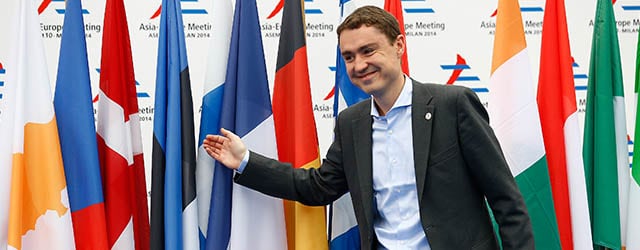Estonians handed victory to 35-year-old Taavi Rõivas and his center-right Reform Party in parliamentary elections on March 1.

The campaign was dominated by growing concerns over interference from neighboring Russia in the former Soviet state, which is now a member of the European Union and NATO.
Rõivas’s victory marks the second win this year for a pro-Western candidate in a former Soviet republic. In mid-February, Moldova’s parliament, which appoints the prime minister, selected Chiril Gaburici, a 38-year-old businessman, who has promised to deepen relations with the West on the back of the association agreement signed in Chiinu with the EU last June.
Estonia’s Rõivas, who became interim prime minister last year and is the youngest leader in the EU, campaigned on a patently pro-Western, free-market platform. By contrast, his main rival, Center Party leader Edgar Savisaar, 65, a former prime minister and now mayor of Tallinn, proposed seeking a warmer relationship with Moscow.
Savisaar was expected to win the election, and many of Estonia’s 1.3 million people—particularly ethnic Russians living near Narva, toward the Russia border—supported his approach. In the event, Savisaar, whom many Estonians feel is too close to Putin and his United Russia Party, won 24.8% of the vote, just 3% less than Rõivas. Yet Rõivas still needs to find a way to address the concerns of the 320,000-strong Russian minority. One of the best ways may be through the economy.
Estonia remains one of the most successful economies in the EU, with GDP this year expected to increase 2.2%. Government debt is less than 10% of GDP, which is around 10% of the EU average. It is also one of the most technologically advanced. Home to Skype before its $8.5 billion sale to Microsoft, it has the most tech-savvy ID card system in the world. Rõivas says further investments in the information and communication technology sector will further consolidate Estonia’s reputation as a modern economic success story—a complete contrast to its large eastern neighbor. He must also be hoping that ethnic Russians prefer this reality to that of Putin’s Russia.



